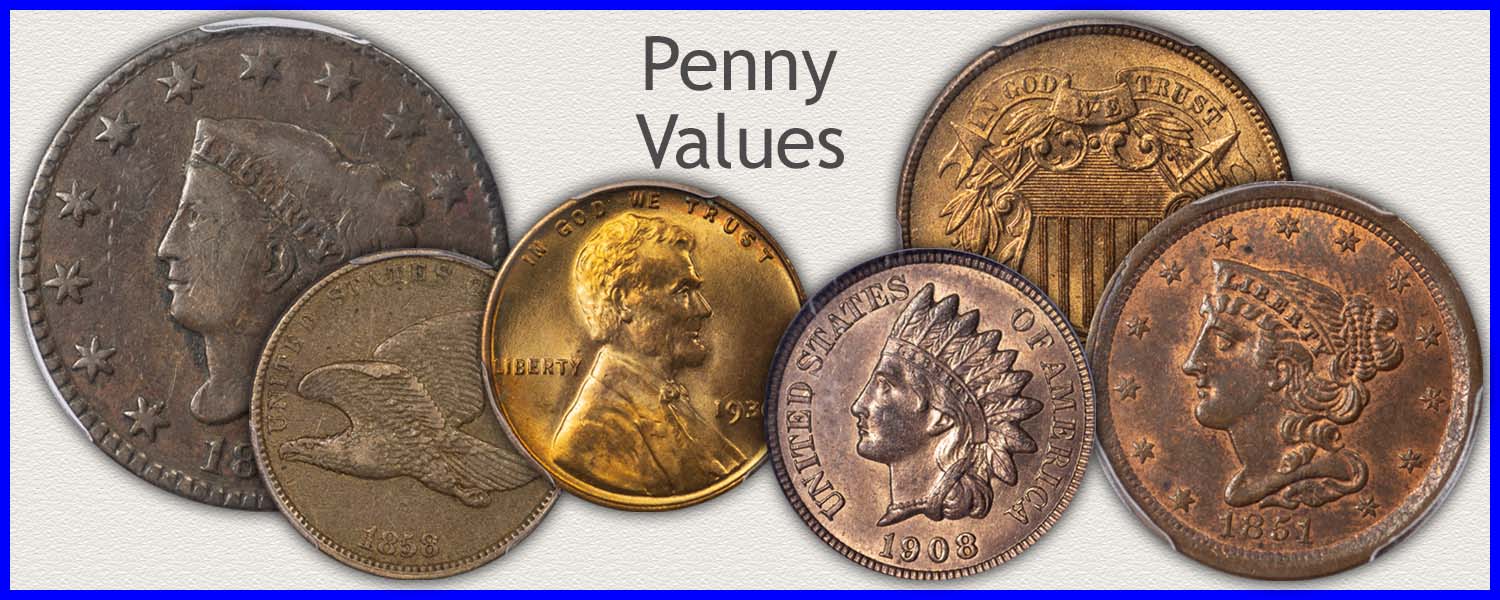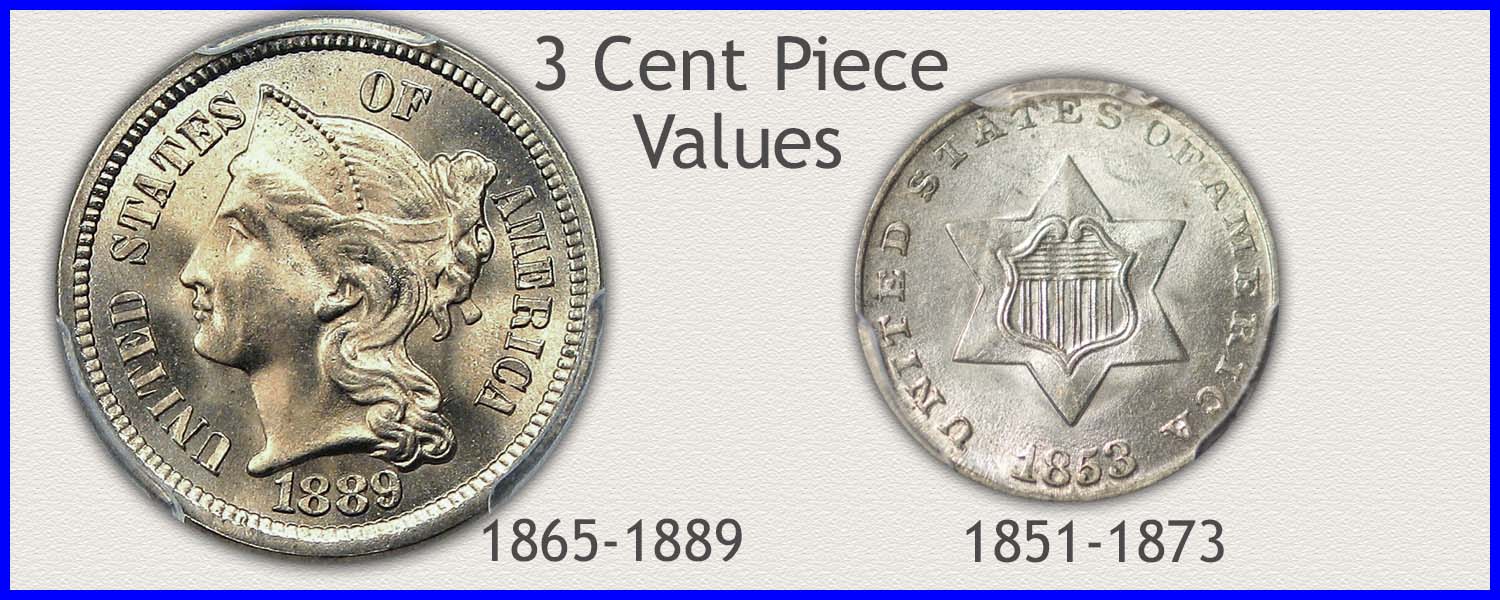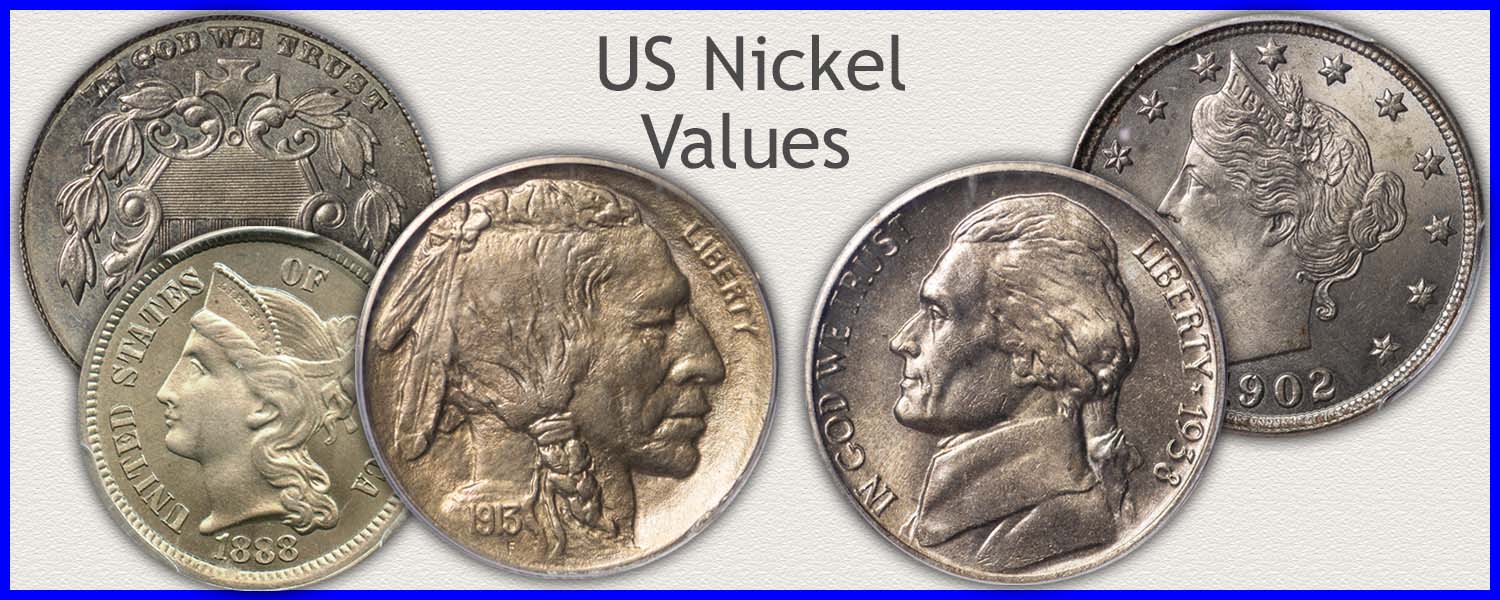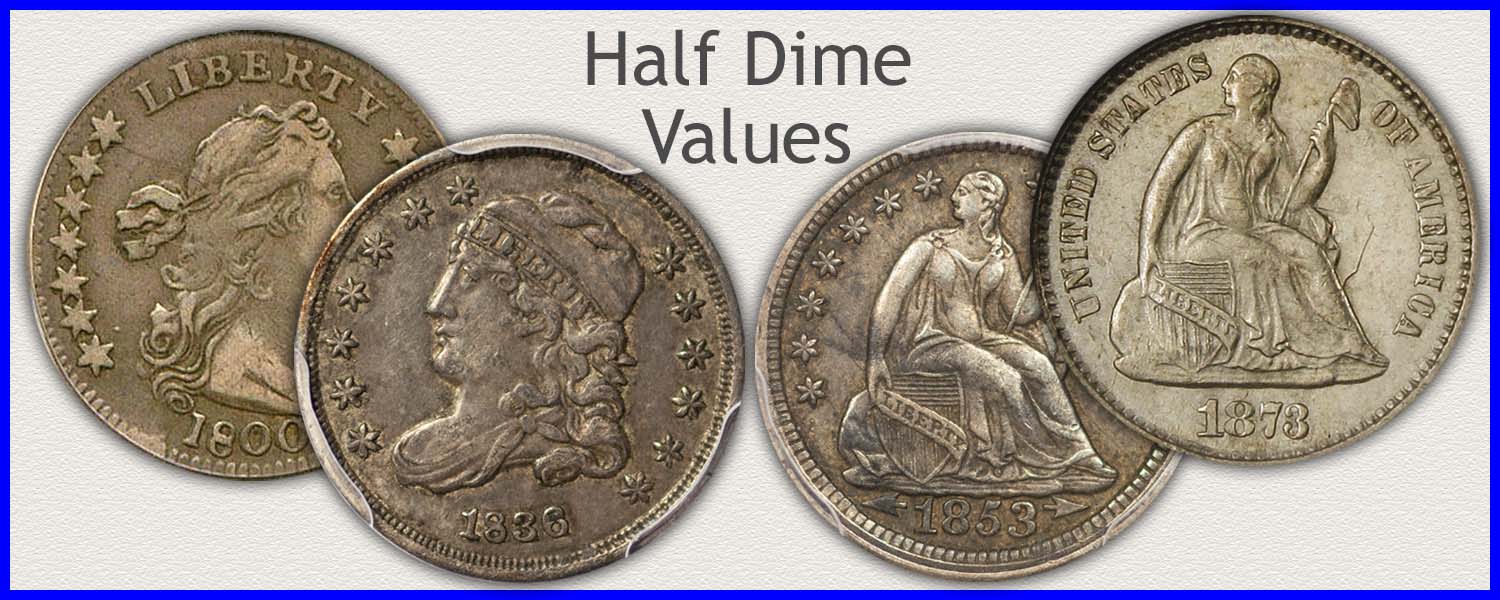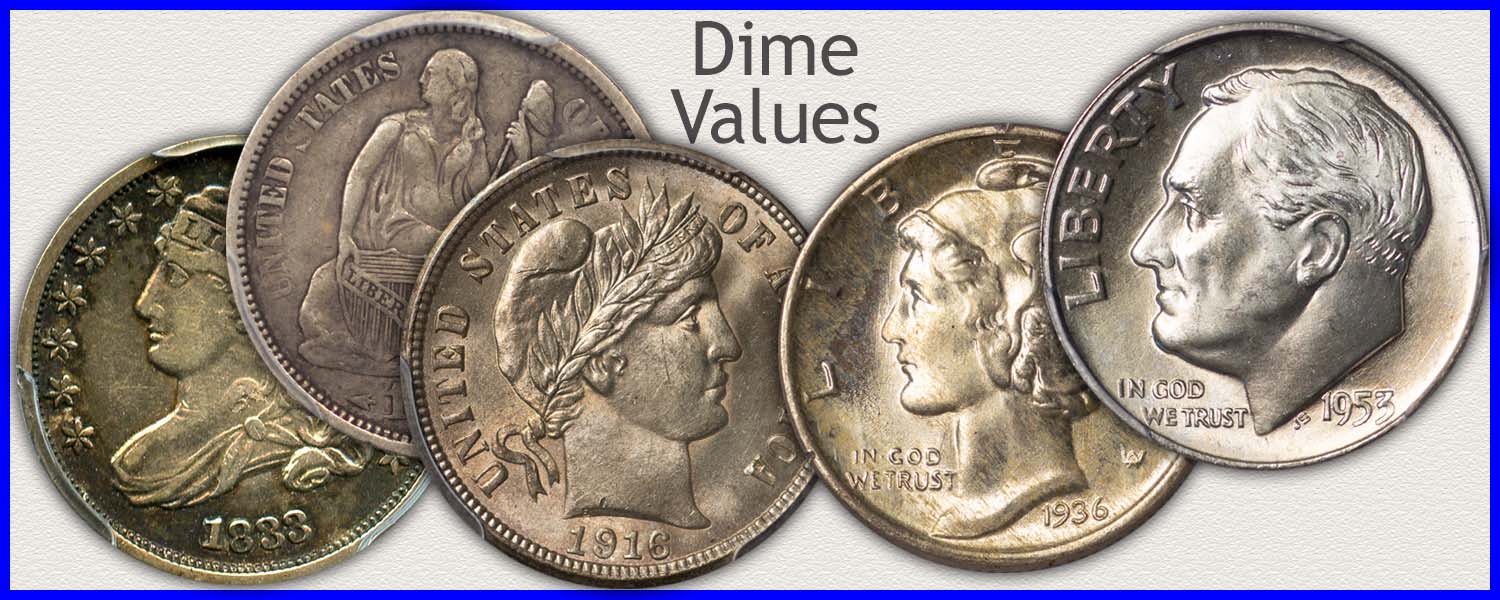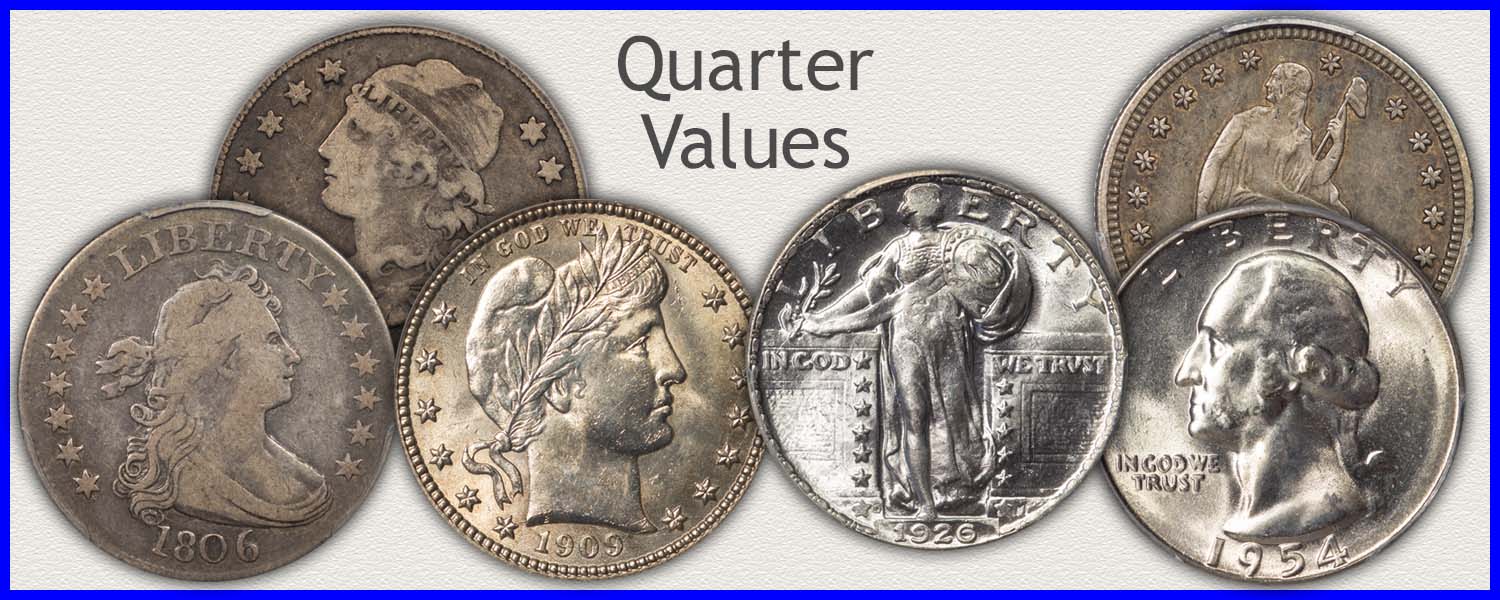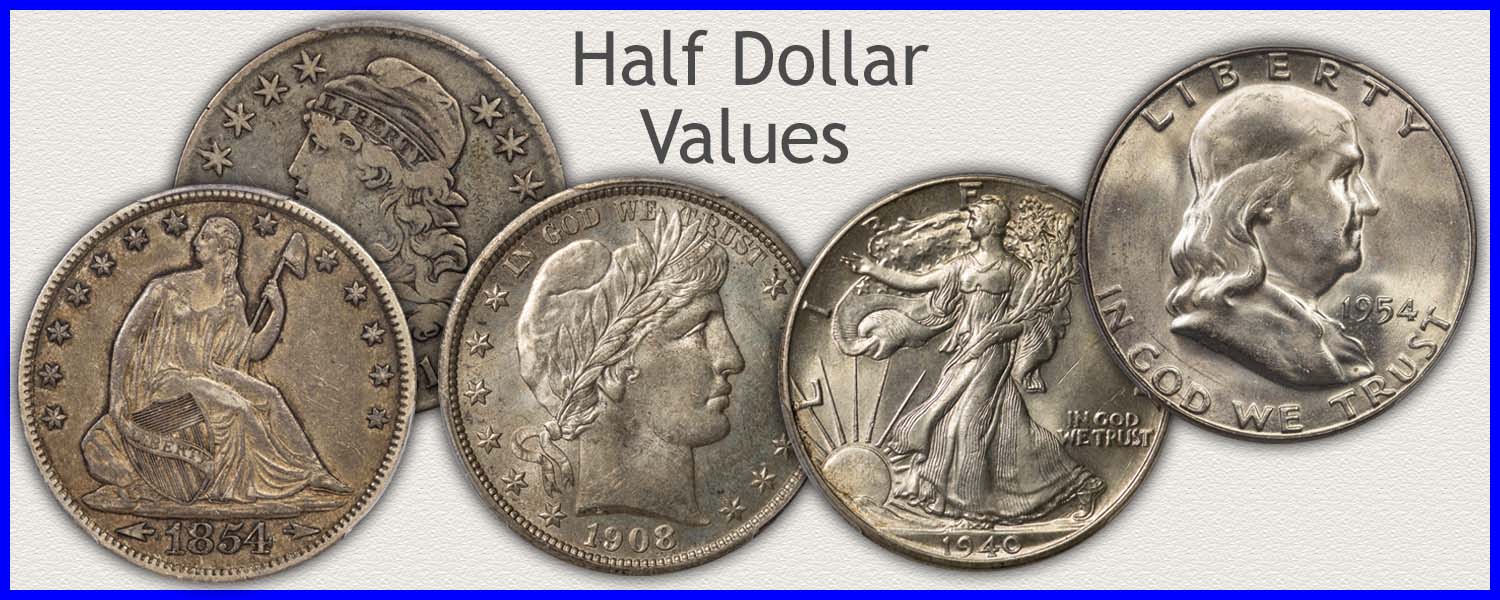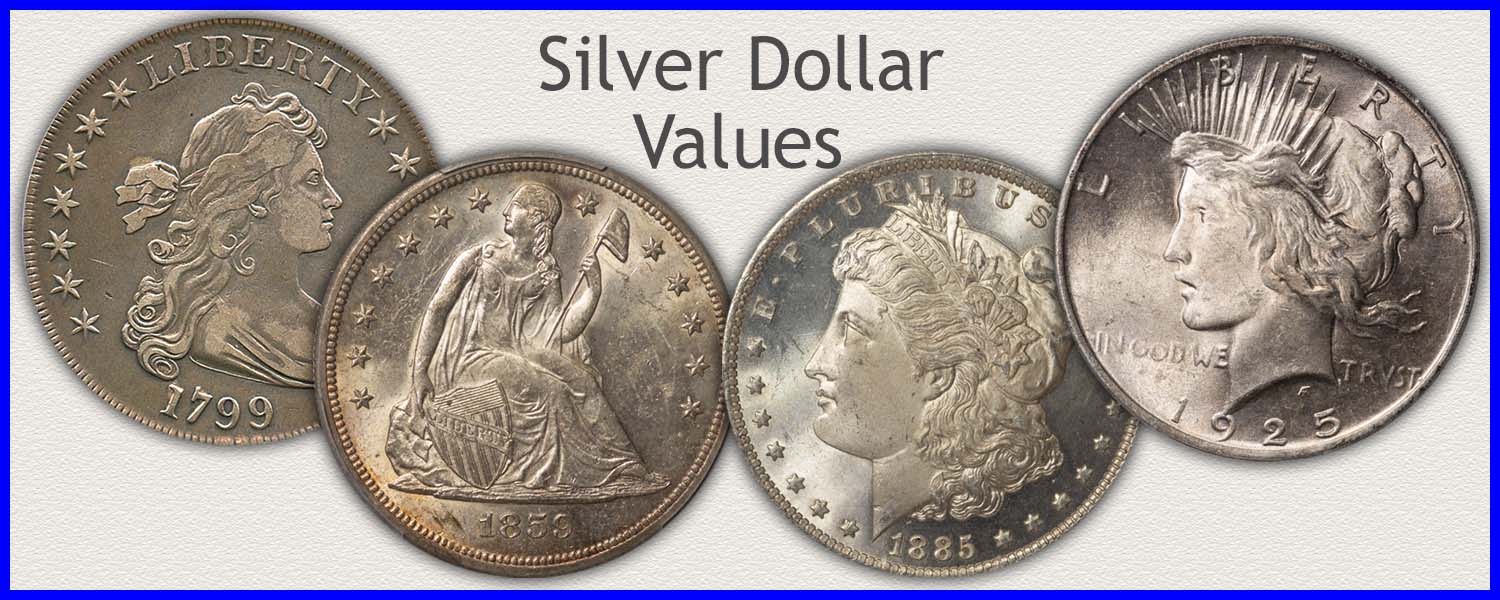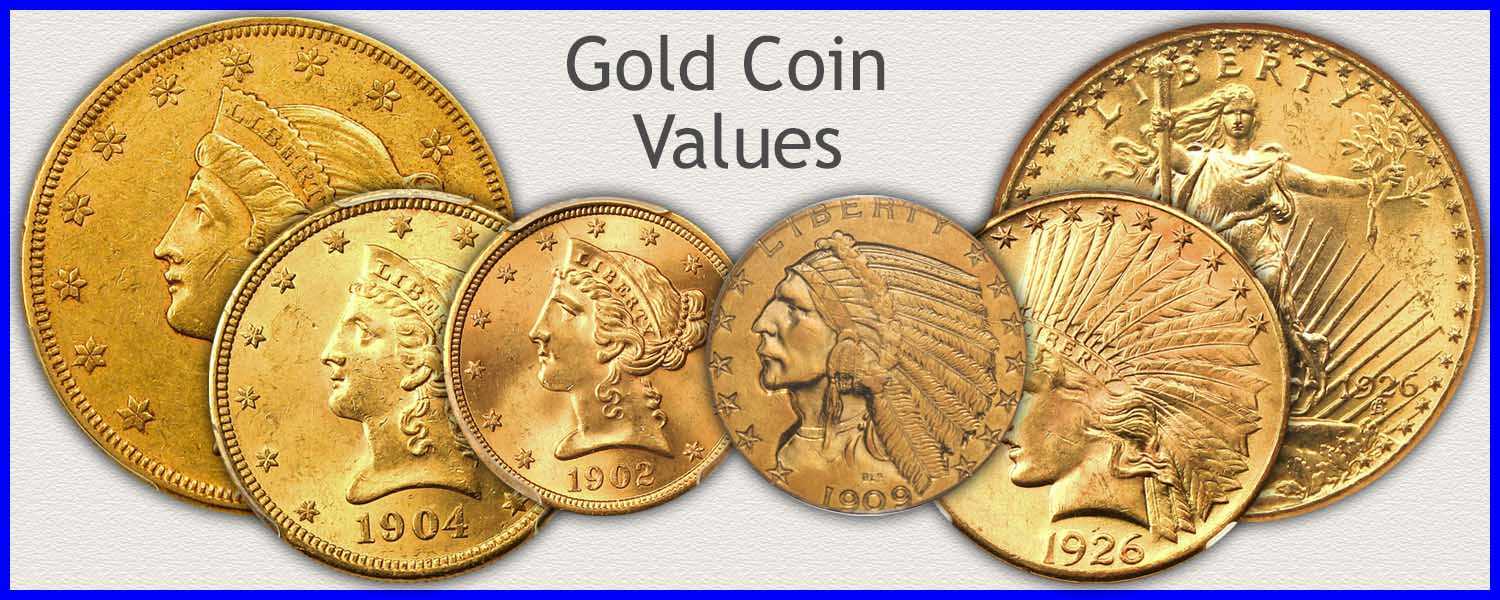Coin Values Moving with Precious Metals: Up-Dated 3/2/2026: Gold $5386 | Silver $94.82
Start Your Coin Values Discovery
Coin values listed for U.S. coin series. Following a step by step method identifies all denominations and design series along with scarce and rare dates. Subtle differences in condition are graded to narrow range on value charts. Discover the value in your box of old coins.
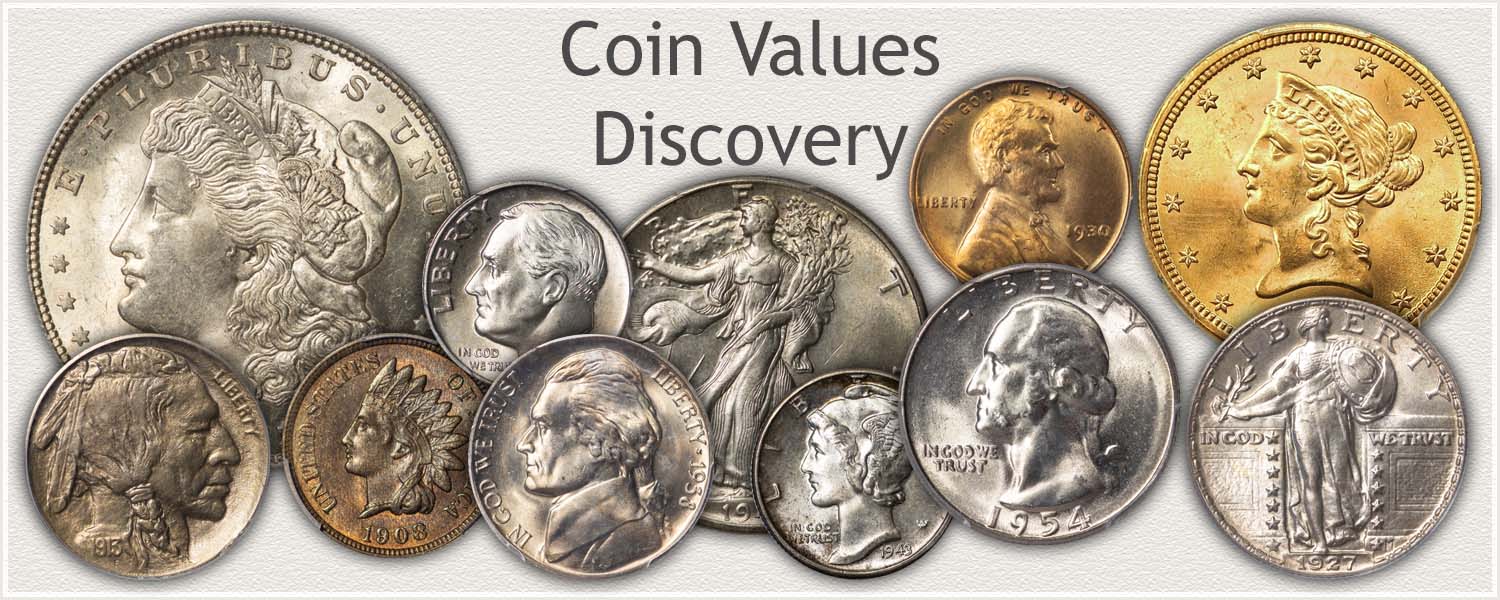
Steps Leading to Value:
- Step 1: Recognize Different Series Within Each Denomination - The denomination and series are identified to start the value process. U.S. coinage began in 1793 and produced many varieties of different series.
- Step 2: Date and Mintmark Variety - Dates become important to value and mintmarks create additional varieties, all are identified. Value charts list coins by date and mintmark.
- Step 3: Grading Condition - Judging condition is done with a close inspection and comparing to standards for the grade. Videos, close-up images and descriptions determine the condition and grade of coins.
- Step 4: Special Qualities - To complete the value process, special qualities are highlighted. Many factors either raise or lower potential value. Each coin has its unique set of special qualities. All explored within the series.
How to determine coin values begins with identifying the denomination and series. Examine your coin and compare to the following images to find a match.
Note: Images within blue borders are Links to the series.
Step 1: | Recognize the Different Series of Coins
Penny Values | Rare Pennies Have Outstanding Values
Values listed for cents. From the earliest Half and Large cents, to Indian head pennies to the popular Wheat cents of 1909 to 1958.
Match you coins to the grading images and value charts. Some of these old pennies have amazing values.
Three Cent Nickel and Three Cent Silver coins are all part of the fascinating series, including many rare dates.
Find value in the details, the rare dates, but mostly grading the condition of your coins reveals how much they are worth.
Old Nickel Values | Guide to Nickels
Coin value charts and grading images help to identify your rare nickels.
Starting with the old Shield nickel first minted in 1866 to the Liberty nickel. Followed by the very popular Buffalo nickel to the Jefferson nickel minted today. Also included is the little know Three Cent Nickel.
Half Dime Value | Quietly Climbing Higher
Scarce today, these small silver coins are sought by dedicated collectors and dealers.
The early Bust issues are very rare and highly prized, followed by the classic Seated Liberty design, always a favorite. An important, valuable US coin, check to see how much your half dime is worth today.
Dimes are featured here. First minted in 1796 there are many rare and collectible varieties to discover.
From the early Bust to the Seated Liberty of 1837-1891. Next the Barber Dime followed by the widely collected Mercury Head dime. Ending with the modern Roosevelt Dimes. Match your coins to the grading images and values charts.
Quarter Values | Discover all the Rare Dates
Quarter Values listed. With grading images to help value all quarter series.
From Bust quarters to Seated Liberty, Barber, Standing Liberty to Washington quarters. For the right coin, values are very high. Discover the rare coin in your box.
Half Dollar Value | Causing Excitement
The result of increased collector demand, your half dollar value is rising.
Starting in 1796 with the Bust variety moving to the Seated Liberty Half many are rare. Followed by the Barber Half dollar then the beautiful and popular Walking Liberty, ending with the Franklin Half dollar in 1963. Auction results are showing all are very popular. Bring out your coins and discover today's value.
Silver Dollar Values | Remarkable
Silver dollar values spanning 140 years. Discover the many rare dates, mintmarks and varieties.
Evaluate condition to find the true value of your silver dollars. From early Bust Dollars first minted in 1794 to the Seated Liberty variety of 1840-1873. Next the ever-popular Morgan Dollars ending with Peace Dollars in 1935.
Values are listed starting with the small but rare 2.5 dollar and ending with the huge twenty-dollar gold coins.
Because the price of gold is rising all gold coins have increased in value greatly. Rare dates, mintmarks and condition separate the common from the very valuable. Examine your coins closely, compare them to the grading images, and find their values listed on the chart.
Video Introduction to the Coin Value Process
Step 2: | Date and Mintmarks Plus Variety are Identified
Dates of coins are the initial identity on value charts. Collections are assembled by dates of a coin series. Each date is studied and common to scarce to rare are recognized. Identity of date is key to an accurate value.
Varieties within a year include Mintmarks: Here begins a more detailed investigation into the exact coin on hand. Each series of coins were minted primarily at the Philadelphia mint. Additional branch mints to produce coins were built as the country expanded and grew economically. Branch mints adding to coinage used a "mintmark" to indicated their production.
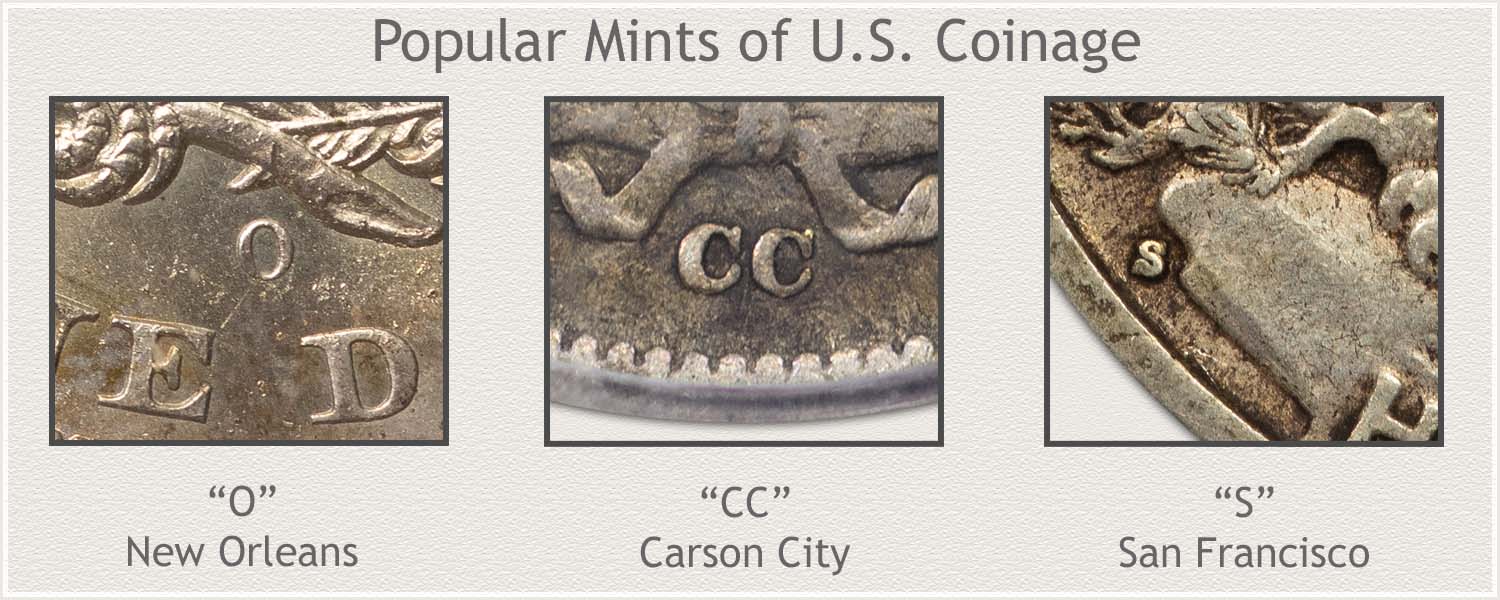
Identifying a possible branch mint coin is the process of locating the "Mintmark" specific to each mint. Mintmarks and their locations are imaged and described in detail for each specific series. Branch mint coins are listed and valued separately on the charts as well.
Collectors often choose a mint to focus a collection around. A worthy collection is New Orleans Morgan dollars. It reduces the series into a manageable size and includes historical coins from a now closed mint. Pictured above are a few mintmarks from popular mints.
🔎In Step 1 above are image links to match your coin. Visit the series page for value charts, mintmark identity and location, and details on how to value coins.
Step 3: | Grading Condition | Coin Values are Conditional
Next step, an important one, is judging the condition of a coin. A close examination is made of the preservation, and a grade is given to its condition. A coin as minted, with no wear, is the top grade, Mint State. As wear develops across the surface, each stage is recognized and judged, and different grades are assigned. Grades are used by collectors and dealers as a metric to define a coin's condition. Value charts list grades and values accordingly. An overview of grades follows.
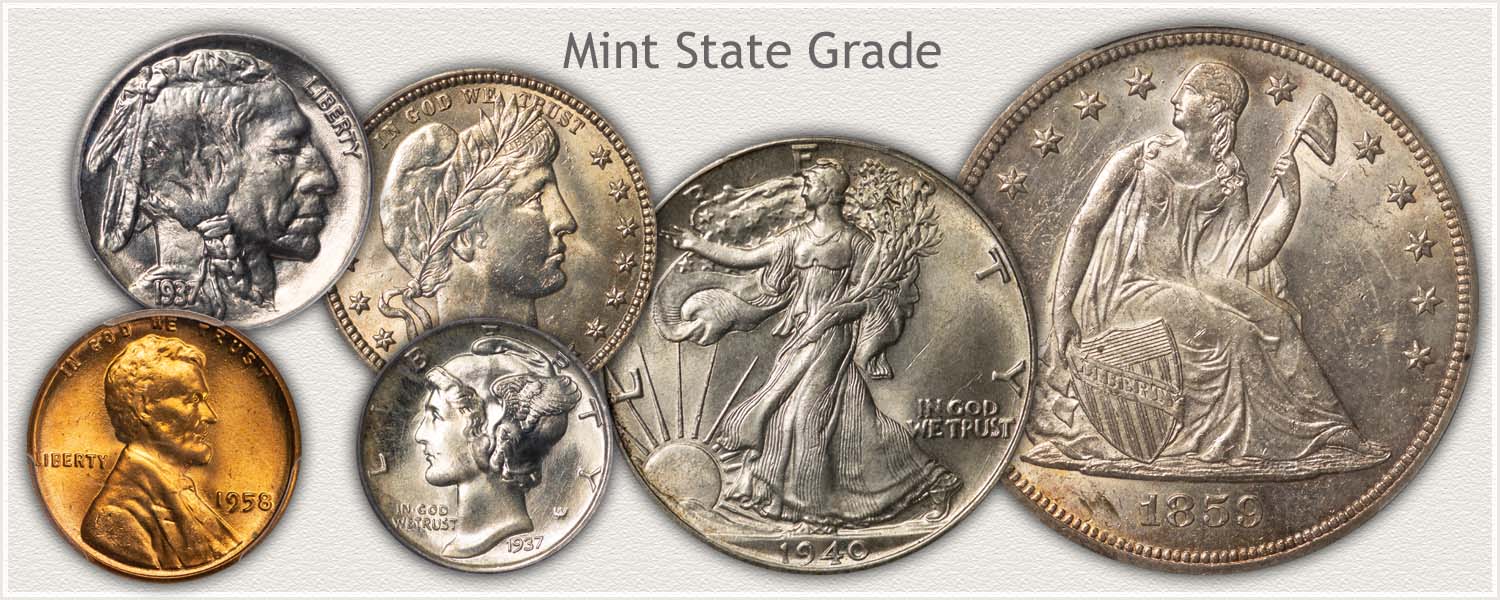
Mint State Grade: When first minted a coin is Mint State grade. No wear to the surface defines the grade. Luster, the fine texture imparted during the minting process covers the coin. Luster, what gives the surface the shine is a delicate texture and high points are examined to confirm this texture remains. It is noted, toning does not indicate wear. Toning lays on top of luster of a mint state grade coin and the original texture is seen underneath when looking through the luster.
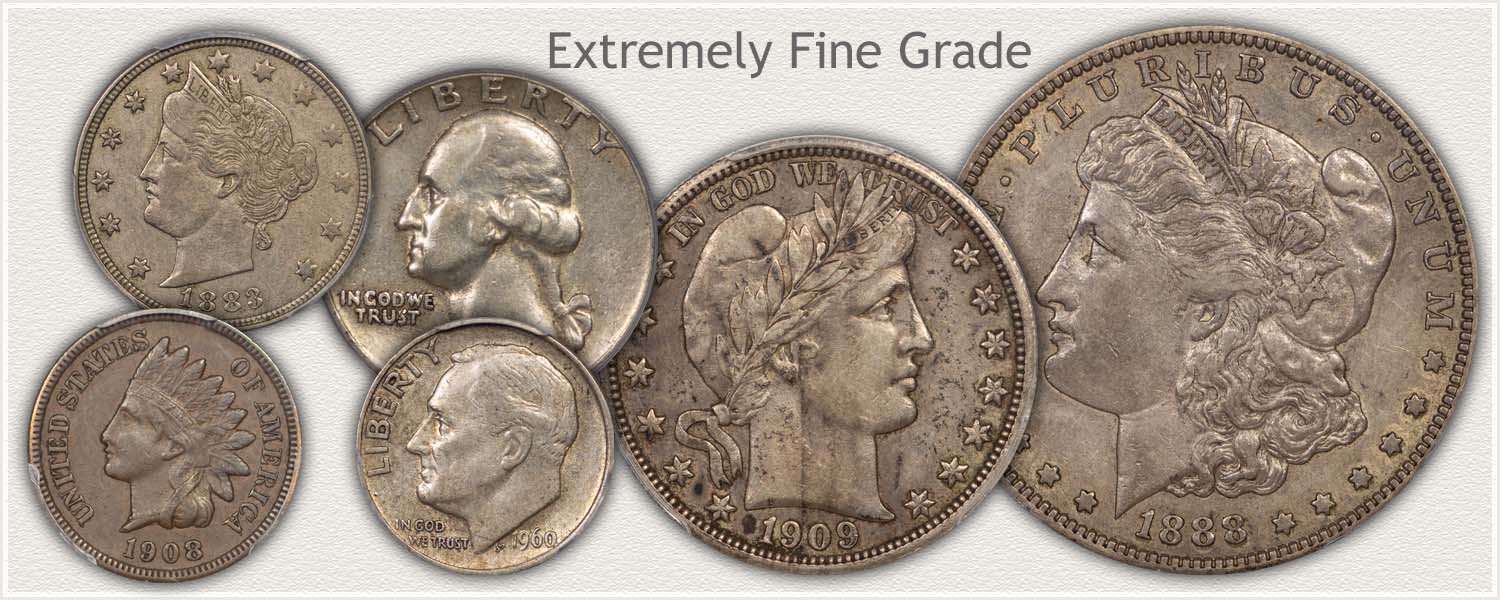
Extremely Fine Grade: Light wear involving only the highest points of the design is a coin in Extremely Fine grade. Small details in high relief areas are worn and merging slightly with surrounding design elements. Each series and design have unique areas to judge for the presence of remaining design defining the grade.
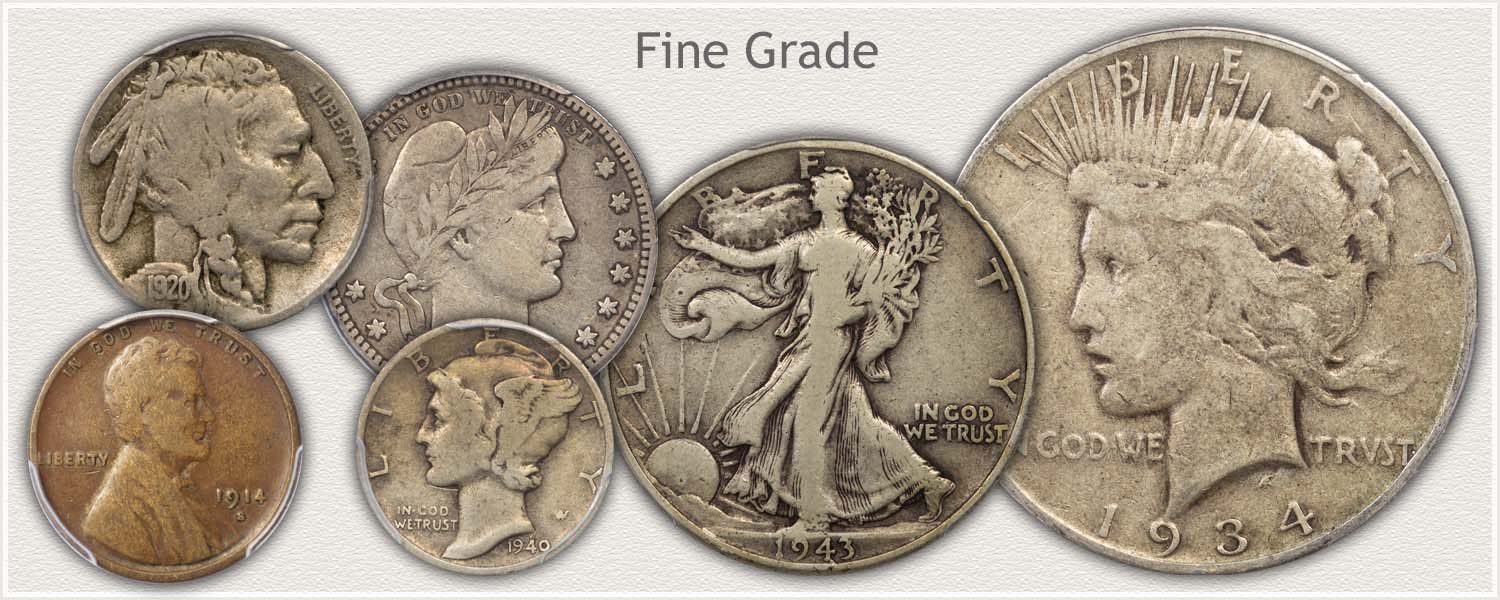
Fine Grade: Moderate wear is easily visible covering the surface of a coin in Fine grade. Smaller details on high spots are missing. Light wear is beginning to smooth deeper reliefs of design creating large flat areas. Flat areas, covering parts of the design but disconnected from each other helps define the grade. Dates and legends are clear and readable.
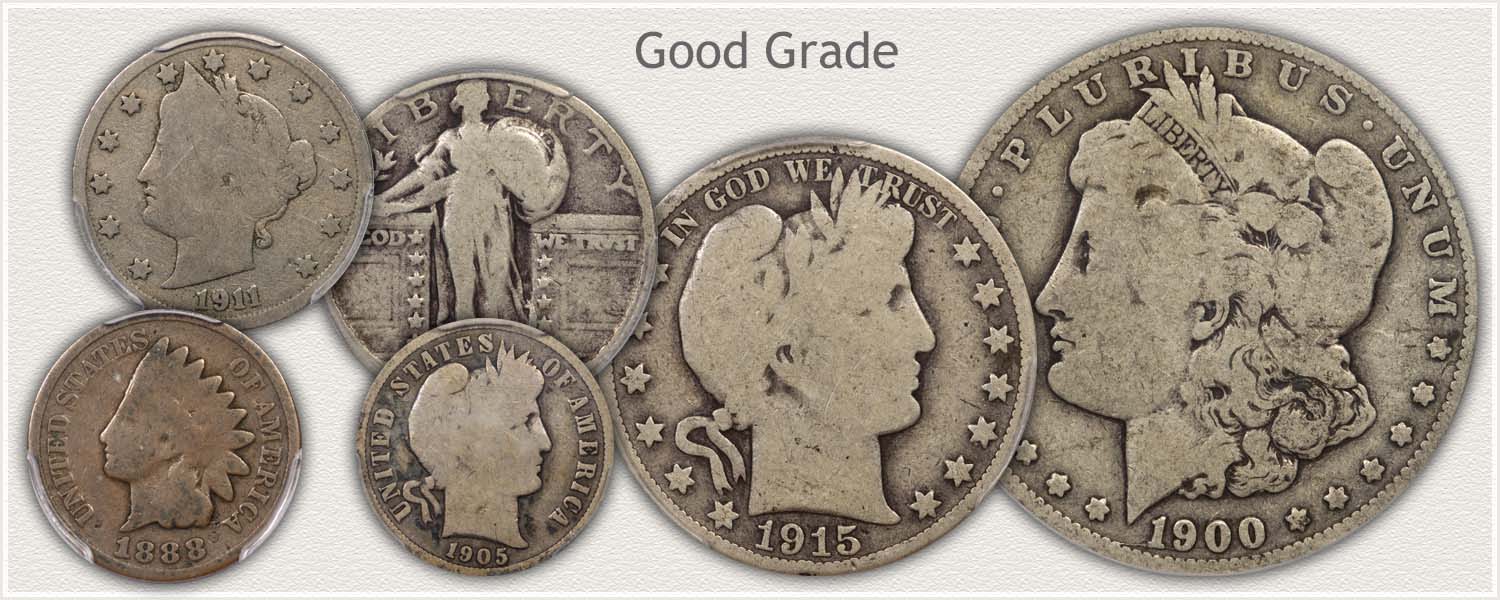
Good Grade: Overall, heavy wear has reduced the design to smooth areas. Portraits and major design areas are in outline with few inner details, however, they remain clear and not merged with the field. Dates and legends are often beginning to fade towards the rim. Tops of lettering is weak on many coins in Good grade.
Grading Old Coins | Visual Guides
Each series of coins, wheat pennies to silver dollars, have unique design features used to identify and determine their condition. Typical wear patterns, when illustrated, help judge each coin's condition into a grade. Close-up images, video, and detailed descriptions, highlight requirements of these grade standards. A comparison method used in the Visual Grading Guides discover the many subtle points to grading old coins and determines how much they are worth.
Step 4: | Special Qualities Enhancing Coin Values
Number one special quality to any coin is; original, natural surfaces remain. All coins age and develop surface characteristics unique to each metal alloy.
Over time, copper begins to deepen the original reds and golden colors on mint state coins. Wear on copper, tones different shades than surrounding protected areas. Silver develops a variety of colors, blues, violets with reddish tints, shades of silver greys on circulated pieces. Gold coins alloyed with copper deepen in color in subtle ways. Slight shading among design elements on gold coins enhance the overall eye appeal.
An eye appealing coin, with natural undisturbed surfaces draws the attention of collectors. It is appreciated, no matter the condition. Aesthetics unique to each coin is its special quality.
This helps answer an often-asked question: Should I clean my old coins?
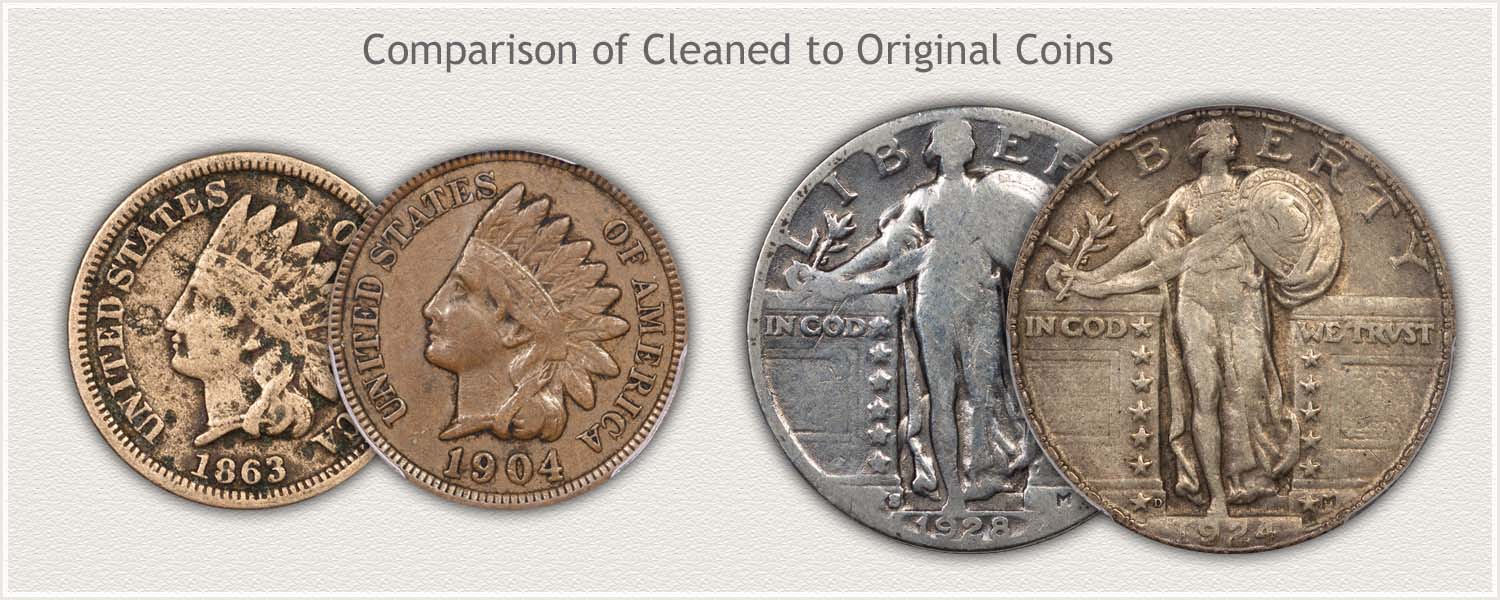
When compared side by side, original coins are clearly higher in eye appeal. Subtle tones of brown on the Indian cent contrasted to the light and dark of the cleaned cent. A warm toning is preferred over the washed-out look of cleaned silver.
If cleaning a coin is an attempt to improve its appearance, it is not necessary. Each collector develops their own preference of appeal of coins.
Adhering to, searching, and finding that pleasing coin is the value in collecting. Cleaning does not add to a coin, it eliminates possible collectors.
🔎Match your coin to the image links in Step 1 and visit the series page to recognize special qualities and determine in-depth coin values.
Discover the Full Value of Your Coins
How high are values today? Let's have a look at a sample box of old coins. What is your estimate of their value, if you owned them how much could you sell them for?
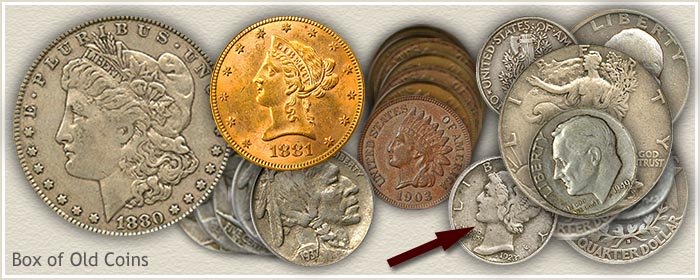
| 3/2/2026 Total Value $2,790.26 | ||||
| $89.67 | $2,567 | $7.50 | $21.00 | $105.09 |
| Morgan Dollar | Mint State $10 Liberty Gold |
Five Buffalo Nickels |
Seven Indian Cents |
$1.65 Face Silver Coins |
The gold piece is a $10 Liberty in "Mint State" condition, meaning it never circulated through commerce. The others are... an average circulated Morgan silver dollar, seven Indian Head pennies that are fairly nice, five buffalo nickels, and $1.65 in face value of silver coins.
However... there is a surprise. The video above uses the Mercury dime from the image as it reviews the value process used by collectors. After a careful study the dime is judged scarce and worth far above it underlining silver value.
Bring your box of old coins to the desk. Arrange them by denomination and then by "condition" meaning from the heavily worn to the least worn. You are ready to consult each coin grading and value chart. If you have a rare date or variety... you soon discover it.
Coin Values | CoinStudy Articles
Coin Value Guide | How to Value a Coin Collection
A step by step method combined with the coin value online guide identifies how to value a coin collection. Discover how much your box of old coins is worth.
Coin values are influenced by a series popularity. Large numbers of collectors create demand showing in premiums paid for coins. Collecting interests are ranked on charts by denomination and series.
Old US Penny Values are Rising
Coin values are determined by using the grading images to judge condition then checking the date and values on the charts provided. Discover all the rare varieties, dates and mintmarks.
Selling Wheat Pennies and Receiving the Highest Price
Separate your old wheat pennies into the main value groups - different decades, mintmarks, rare dates, and importantly condition. Preparing and selling wheat pennies for the best value is possible.
An excellent picture index of all major US coin series. Identify your coin, click on the image or link and go immediately to your old coin value.
A quick reference to US Coin Values. Images to identify each coin and minimum values for each type. Using the step by step method to how much coins are worth. Bookmark the online value charts to phone.
Old Coin Values Driven by Demand
Values rise and fall according to collector demands. What are they looking for today, rare dates, a popular coin series, specific grades (condition) of coins? These and many factors determine value. Discover the surprising value of your old coins.
Today's 2 Cent Coin Value | Solid
A short series highlighted by a couple of rare dates and a rare variety. A careful look at your 2 cent coin is necessary. Examine your coins, compare them to grading images and discover today's solid values.
Selling Coins | How to Get the Best Value
Selling coins for the highest price is achieved with planning. Research and organize well, value your coins accurately, and then finding and selling to the right buyer equals excellent results.
Today's Minimum Silver Coin Values
Many of your old US silver coin values are tied closely to the price of silver. Silver dimes, quarters, half dollars, and silver dollars are all heavy with 90% silver and worth many times their face value. With today's high price of silver your old coins are becoming surprisingly valuable.
Note: As stated in our Privacy Policy page, we do not sell personal information.
